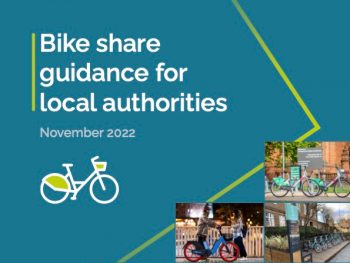Councils urged to use Clean Air Zone revenues for bike share
Councils have been urged to treat bike share as a key part of their sustainable transport offer and enable sufficient funding for it, including from Clean Air Zone revenues.
A new report from national shared transport charity Collaborative Mobility UK (CoMoUK) highlights that more than 40 operating or planned bike share schemes across the UK are attracting people back to cycling, delivering mental and physical health benefits, and helping the environment.
It’s now called for a partnership approach between operators and local authorities to address financial issues and encourage take-up, ensuring bike share is seen as a key part of public transport and the UK’s journey to net zero.
CoMoUK’s report, which offers practical guidance to local authorities on establishing schemes, sets out potential deployment costs ranging from £500,000 to £7.75m, depending on fleet size and whether pedal bikes, electric bikes (e-bikes), or both are used.
But it also found rider income alone is seldom enough to cover costs during the first or second year of a scheme, with existing operators reporting shortfalls. And it advises that gaps can be plugged through a flexible allocation of capital funding – in particular, it recommends councils explore using revenue raised from policies such as developer contributions, government funding pots and any Clean Air Zones.
Richard Dilks, chief executive of CoMoUK, said: “It is encouraging that bike share is increasingly becoming a valuable component of a wider sustainable transport network.
“Ultimately, if we are to achieve our ambitious net zero targets, we need to address the issue of private car ownership, which massively contributes to the UK’s emissions.
“Shared transport such as bike share schemes, along with car clubs, demand responsive transport and e-scooters, are the key to achieving our goals.”
The report can be read here.














